Tonight, Obama was text book! :pud:
Does America really want a change?
Collapse
This topic is closed.
X
X
-
Comment
-
its not too late HD to get on the winning train :party:
Gallup Daily: 9-Point Obama Lead Ties Campaign High****all plays 4.4 units to win 4 units unless otherwise noted****
NBA 20-22 -16.8 units
NHL 1-0 +4.0 units
MLB 0-1 -4.8 units
CFB 12-6-1 +21.6 unitsComment
-
NFW :puke: I will NOT be part of that TRAIN WRECK!its not too late HD to get on the winning train :party:
Gallup Daily: 9-Point Obama Lead Ties Campaign High
Glenn Beck presents the Obama National Anthem
<object width="425" height="344"><param name="movie" value="http://www.youtube.com/v/l46t_nrySg4&hl=en&fs=1"></param><param name="allowFullScreen" value="true"></param><embed src="http://www.youtube.com/v/l46t_nrySg4&hl=en&fs=1" type="application/x-shockwave-flash" allowfullscreen="true" width="425" height="344"></embed></object>Comment
-
100 U.S. Ambassadors Endorse McCain-Palin
FORMER U.S. AMBASSADORS FOR MCCAIN-PALIN
Weston Adams, Malawi -- Columbia, S.C.
Lenore Annenberg, Chief of Protocol -- Radnor, Penn.
Cresencio Arcos, Jr., Honduras; FP/NS -- Coral Gables, Fla.
George Argyros, Spain and Andorra -- Costa Mesa, Calif.
Catherine Todd Bailey, Latvia -- Louisville, Ky.
Howard H. Baker, Jr., Senator (R-TN); Senate Majority Leader; Amb. Japan -- Huntsville, Tenn.
Douglas H. Barclay, El Salvador -- Pulaski, N.Y.
Stuart A. Bernstein, Denmark -- Washington, D.C.
Everett E. Bierman, Papua New Guinea -- Oakton, Va.
Julia Chang Bloch, Nepal -- Washington, D.C.
John Bolton, United Nations
Stephen F. Brauer, Belgium -- Bridgeton, Mo.
Keith Lapham Brown, Lesotho; Denmark -- San Antonio, Texas
Donald Burnham, Ensenat, Brunei; Chief of Protocol -- New Orleans, La .
Richard R. Burt, Germany -- Washington, D.C.
President George H.W. Bush, United Nations -- Houston, Texas
William J. Cabaniss, Jr., Czech Republic -- Birmingham, Ala.
Richard G. Capen Jr., Spain -- Rancho Santa Fe, Calif.
Richard W. Carlson, Seychelles -- Weems, Va.
Frank Carlucci III, Portugal
Bruce Chapman, IAEA; Vienna -- Seattle, Wash.
Sue McCourt Cobb, Jamaica -- Coral Gables, Fla.
Charles E. Cobb, Jr., Iceland -- Coral Gables, Fla.
Walter J.P. Curley, Ireland; France -- New York, N.Y.
Peter H. Dailey, Ireland; Special Envoy to NATO Countries -- Pasadena, Calif.
Mark L. Edelman, Cameroon -- Washington, D.C.
Mark Erwin, Mauritius, Seychelles and Comoros -- Charlotte, N.C.
Richard M. Fairbanks III, Ambassador-at-Large -- Washington, D.C.
William S. Farish III, United Kingdom -- Versailles, Ky.
Edward R. Finch, Jr., Panama -- New York, N.Y.
John R. Gavin, Mexico -- Los Angeles, Calif.
Bruce S. Gelb, USIA; Belgium -- N ew York, N.Y.
Joseph B. Gildenhorn, Switzerland -- Washington, D.C.
Anthony H. Gioia, Malta -- Buffalo, N.Y.
Luis Guinot, Jr., Costa Rica -- Falls Church, Va.
Margaret M. Heckler, Ireland -- Arlington, Va.
Charles A. Heimbold, Jr., Sweden -- Riverside, Conn.
Hans H. Hertell, Dominican Republic -- Washington, D.C.
Alfred Hoffman, Jr., Portugal -- Fort Meyers, Fla.
Richard Holwill, Ecuador
G. Philip Hughes, Barbados, Dominica, St. Lucia, St. Vincent and Grenadines -- Falls Church, Va.
Jon M. Huntsman, Jr., Singapore -- Salt Lake City, Utah
Robert S. Ingersoll, Japan -- Evanston, Ill.
James C. Kenny, Ireland -- Glenview, Ill.
Alfred H. Kingon, European Union -- Bronxville, N.Y.
Lester B. Korn, UN Economic and Social Council -- Beverly Hills, Calif.
Mary E. Kramer, Barbados and Eastern Caribbean -- Clive, IA
Paul C. Lambert, Ecuador -- New York, N.Y.
Mark Langdale, Costa Rica -- Dallas, Texas
Howard Leach, France -- Salinas, Calif.
Melvyn Levinsky, Bulgaria and Brazil -- Ann Arbor, Mich.
John L. Loeb, Jr., Denmark -- New York, N.Y.
Earle I. Mack, Finland -- Fort Lee, N.J.
Susan Rasinski McCaw, Austria -- Kirkland, Wash.
Robert C. McFarlane, Special Envoy for the President
Thomas Patrick Melady, Burundi, Uganda, Holy See -- Washington, D.C.
J. William Middendorf II, Netherlands, OAS, European Union -- Little Compton, R.I.
Steve Minikes, CSCE -- Washington, D.C.
George Cranwell Montgomery, Sultanate of Oman
Thomas A. Nassif, Morocco -- La Jolla, Calif.
Gregory J. Newell, Sweden -- Provo, Utah
Edward N. Ney, Canada -- New York, N.Y.
Jim Nicholson, Holy See -- McLean, Va.
Herman W. Nickle, South Africa -- Tucson, Ariz.
Julian M. Niemczyk, Czechoslovakia -- Annandale, Va.
Keith Foote Nyborg, Finland -- Sugar City, Idaho
John D. Ong, Norway -- Hudson, Ohio
Penne Korth Peacock, Mauritius -- Washington, D.C.
Joseph Carlton Petrone, United Nations European Office -- Dublin, N.H.
Charles J. Pilliod, Jr., Mexico -- Akron, Ohio
John Price Mauritius, Seychelles and Comoros -- Salt Lake City, Utah
Charles H. Price, II, Belgium, United Kingdom -- Kansas City, Mo.
James W. Rawlings, Zimbabwe -- Southbury, Conn.
Otto J. Reich, Venezuela -- Washington, D.C.
Mercer Reynolds, Switzerland and Liechtenstein -- Indian Hill, Ohio
Gilbert A. Robinson, Special Advisor to the Secretary of State -- McLean, Va.
Joe M. Rodgers, France -- Nashville, Tenn.
Sig Rogich, Iceland -- Las Vegas, Nev.
John Rood, Bahamas -- Jacksonville, Fla.
Francis L. Rooney III, Holy See -- Naples, Fla.
Frank Ruddy, Equatorial Guinea
Bob Royall, Tanzania -- South Carolina
Rockwell A. Schnabel, Finland, European Union -- Los Angeles, Calif.
Peter F. Secchia, Italy -- Grand Rapids, Mich.
Martin J. Silverstein, Uruguay -- New York, N.Y.
Ronald J. Sorini, Chief Textile Negotiator, U.S. Trade Representative -- Hinsda le, Ill.
Michael G. Sotirhos, Jamaica, Greece -- Lauderdale by the Sea, Fla.
Robert D. Stuart, Jr., Norway -- Lake Forest, Ill.
Charles J. Swindells, New Zealand, Samoa -- Portland, Ore.
Peter Terpeluk, Jr., Luxembourg -- Washington, D.C.
Timothy L. Towell, Paraguay -- Washington, D.C.
Rodolphe M. Vallee, Slovakia -- Shelburne, Vt.
Leon J. Weil, Nepal -- New York, N.Y.
John G. Weinmann, Finland, Chief of Protocol -- New Orleans, La.
Ronald N. Weiser, Slovakia -- Ann Arbor, Mich.
Pamela P. Willeford, Switzerland and Liechtenstein -- Austin, Texas
Richard Williamson, Asst. Secy; Amb. IAEA -- Chicago, Ill.
Curtin Winsor, Jr., Costa Rica -- McLean, Va.
Dr. Aldona Z. Wos, Estonia -- Greensboro, N.C.
Joseph Zappala, Spain -- Aventura, Fla.Comment
-
ICYMI: McCain-Palin Campaign Conference Call On The American Homeownership Resurgence Plan
"Senator McCain last night announced his initiative, the McCain Resurgence Plan, that has four very straightforward goals. Goal number one is to provide direct help to struggling homeowners, making sure they can stay in their homes with a manageable mortgage, avoid foreclosures and the damaging impact that has on neighborhoods and property values in that area. It would also, in the process of refinancing, help them with their financial situation, and as a result, give some stability to the household spending in the overall economy." -- Doug Holtz-Eakin, Senior Policy Adviser
ARLINGTON, VA -- Today, the McCain-Palin campaign held a press conference call with Doug Holtz-Eakin, McCain-Palin senior policy adviser, to discuss John McCain's American Homeownership Resurgence Plan:
Doug Holtz-Eakin: "Senator McCain last night announced his initiative, the McCain Resurgence Plan, that has four very straightforward goals. Goal number one is to provide direct help to struggling homeowners making sure they can stay in their homes with a manageable mortgage, avoid foreclosures and the damaging impact that has on neighborhoods and property values in that area. It would also, in the process of refinancing, help them with their financial situation and, as a result, give some stability to the household spending in the overall economy.
"Second thing is it would provide, to the mortgage market, lower interest rates. If history was a guide, we'd see a spread of about 160 basis points above government interest rates to the mortgage market. That would put interest rates in the low five percent. Mortgage rates are above that right now. Providing this kind of financing would stabilize housing values and obviously take some stress off the pressures downward in the economy. Having a stabilized housing market would, in turn, combine with the purchase of these mortgages to stabilize the values that are underneath mortgage-backed securities and all the housing-related derivatives that have been plaguing the valuation of balance sheets in the financial sector. And so by starting with the homeowner and working up you accomplish some of the objectives of the financial stabilization plans that we've seen come out of Congress and proposed by the administration in recent weeks. Senator McCain beli eves this is exactly the right kind of policy: provide direct help to homeowners and, at the same time, support the financial markets and keep them from further damaging the availability of credit to Main Street America, one of the real threats to the economy at this point it time.
"The initiative would rely on authorities that have been provided in recent months by the Congress. There's $300 billion worth of refinance capacity at the FHA at this point. That can be combined with the statutory capacity at Fannie Mae and Freddie Mac, which are now owned by the federal government for all practical purposes, to purchase mortgages. If Fannie Mae or Freddie Mac bought 80% of the mortgage, you could leverage that $300 billion in financing tremendously. And there's also the $700 billion that was provided to the Treasury by the Congress. There's direct purchase authority in there that would allow to augment these as well, although, it may be useful to reserve that for other purposes.
"Mechanically the initiative is very simple. A homeowner would initiate the process by calling a mortgage broker or other originator and basically saying 'I'd like to refinance my home.' They would start the underwriting process, verify incomes, this is an opportunity as well to make sure the program has in it appropriate checks to make sure that government money is not being given to folks who are not primary homeowners, who don't have adequate income, or otherwise, in the initial purchase of their home didn't provide valid information. These authorities could then be used to retire the existing loan. The FHA would issue a guaranteed thirty year fixed-rate mortgage at a manageable interest rate. The homeowner would stay in the home, their financial burden would be relieved, the valuation of the existing loan would be resolved, there would no longer be a threat of default or diminished capacity to repay. That would stabilize financial markets, and t he taxpayers' contribution would be, in some cases the difference between the values of those two loans, something which would be the necessity for taxpayer contribution.
"Senator McCain thinks this is the best way to go forward. He's obviously been personally very concerned about the problems facing the economy. He has participated, as I think everyone on this call knows, extensively in the process of taking the initial proposal by the administration to directly purchase Wall Street securities shaping it in a way that it was both possible to get it through Congress in a bi-partisan fashion, and also had it augmented with the adequate taxpayer protections, some oversight and transparency. This would take the authorities that have now come through and further target them in a way that he thinks would accomplish the purposes of financial stabilization but also to provide some relief to homeowners, near-term stimulus to the overall economy, and lay out a path where he can then turn to his initiatives in taxes, in energy, healthcare, trade to provide job creation in the American economy and a path forward out of this ter rible crisis."Comment
-
Economists Statement on Barack Obama's Risky Economic Proposals
100 Economists Warn That With Current Weak Financial Conditions Barack Obama's Proposals Run A High Risk Of Throwing The US Into A Deep Recession
ARLINGTON, VA -- Today, McCain-Palin 2008 released the following statement signed by 100 distinguished and experienced economists at major American universities and research organizations, including five Nobel Prize winners Gary Becker, James Buchanan, Robert Mundell, Edward Prescott, and Vernon Smith. The economists explain why Barack Obama's proposals, including "misguided tax hikes," would "decrease the number of jobs in America." The prospects of such tax rate increases under Barack Obama are already harming the economy. The economists conclude that "Barack Obama's economic proposals are wrong for the American economy." The proposals "defy both economic reason and economic experience."
The full economists' statement on Barack Obama's economic proposals and a complete list of economists who support it follows:
Barack Obama argues that his proposals to raise tax rates and halt international trade agreements would benefit the American economy. They would do nothing of the sort. Economic analysis and historical experience show that they would do the opposite. They would reduce economic growth and decrease the number of jobs in America. Moreover, with the credit crunch, the housing slump, and high energy prices weakening the U.S. economy, his proposals run a high risk of throwing the economy into a deep recession. It was exactly such misguided tax hikes and protectionism, enacted when the U.S. economy was weak in the early 1930s, that greatly increased the severity of the Great Depression.
We are very concerned with Barack Obama's opposition to trade agreements such as the pending one with Colombia, the new one with Central America, or the established one with Canada and Mexico. Exports from the United States to other countries create jobs for Americans. Imports make goods available to Americans at lower prices and are a particular benefit to families and individuals with low incomes. International trade is also a powerful source of strength in a weak economy. In the second quarter of this year, for example, increased international trade did far more to stimulate the U.S. economy than the federal government's "stimulus" package.
Ironically, rather than supporting international trade, Barack Obama is now proposing yet another so-called stimulus package, which would do very little to grow the economy. And his proposal to finance the package with higher taxes on oil would raise oil prices directly and by reducing exploration and production.
We are equally concerned with his proposals to increase tax rates on labor income and investment. His dividend and capital gains tax increases would reduce investment and cut into the savings of millions of Americans. His proposals to increase income and payroll tax rates would discourage the formation and expansion of small businesses and reduce employment and take-home pay, as would his mandates on firms to provide expensive health insurance.
After hearing such economic criticism of his proposals, Barack Obama has apparently suggested to some people that he might postpone his tax increases, perhaps to 2010. But it is a mistake to think that postponing such tax increases would prevent their harmful effect on the economy today. The prospect of such tax rate increases in 2010 is already a drag on the economy. Businesses considering whether to hire workers today and expand their operations have time horizons longer than a year or two, so the prospect of higher taxes starting in 2009 or 2010 reduces hiring and investment in 2008.
In sum, Barack Obama's economic proposals are wrong for the American economy. They defy both economic reason and economic experience.
Robert Barro, Harvard University
Gary Becker, University of Chicago
Sanjai Bhagat, University of Colorado
Michael Block, University of Arizona
Brock Blomberg, Claremont-McKenna University
Michael Bordo, Rutgers University
Michael Boskin, Stanford University
Ike Brannon, McCain-Palin 2008
James Buchanan, George Mason University
Todd Buchholtz, Two Oceans Fund
Charles Calomiris, Columbia University
Jim Carter, Vienna VA
Barry Chiswick, University of Illinois at Chicago
John Cogan, Hoover Institution
Kathleen Cooper, Southern Methodist University
Ted Covey, McLean VA
Dan Crippen, former CBO Director
Mario Crucini, Vanderbilt
Steve Davis, University of Chicago
Christopher DeMuth, American Enterprise Institute
William Dewald, Ohio State University
Frank Diebold, University of Pennsylvania
Isaac Ehrlich, State University of New York at Buffalo
Paul Evans, Ohio State University
Dan Feenberg, NBER
Martin Feldstein, Harvard University
Eric Fisher, California Polytechnic State University
Kristin Forbes, MIT
Timothy Fuerst, Bowling Green State University
Diana Furchtgott-Roth, Hudson Institute
Paul Gregory, University of Houston
Earl Grinols, Baylor University
Rik Hafer, Southern Illinois University Edwardsville
Gary Hansen, UCLA
Eric Hanushek, Hoover Institutions
Kevin Hassett, American Enterprise Institute
Arlene Holen, Technology Policy Institute
Douglas Holtz-Eakin, McCain-Palin 2008
Glenn Hubbard, Columbia University
Owen Irvine, Michigan State University
Mike Jensen, Harvard University
Steven Kaplan, University of Chicago
Robert King, Boston University
Meir Kohn, Dartmouth
Marvin Kosters, American Enterprise Institute
Anne Krueger, Johns Hopkins University
Phil Levy, American Enterprise Institute
Larry Lindsey, The Lindsey Group
Paul W. MacAvoy. Yale University
John Makin, American Enterprise Institute
Burton Malkiel, Princeton University
Bennett McCallum, Carnegie-Mellon University
Paul McCracken, University of Michigan
Will Melick, Kenyon College
Allan Meltzer, Carnegie-Mellon University
Enrique Mendoza, University of Maryland
Jim Miller, George Mason University
Michael Moore, George Washington University
Robert Mundell, Columbia University
Tim Muris, George Mason University
Kevin Murphy, University of Chicago
Richard Muth, Emory University
Charles Nelson, University of Washington
Bill Niskanen, Cato Institute
June O'Neill, Baruch College, CUNY
Lydia Ortega, San Jose State University
Steve Parente, University of Minnesota
William Poole, University of Delaware
Michael Porter, Harvard University
Barry Poulson, University of Colorado, Boulder
Edward Prescott, Arizona State University
Kenneth Rogoff, Harvard University
Richard Roll, UCLA
Harvey Rosen, Princeton University
Robert Rossana, Wayne State University
Mark Rush, University of Florida
Tom Saving, Texas A&M University
Anna Schwartz, NBER
George Shultz, Stanford University
Chester Spatt, Carnegie-Mellon University
David Spencer, Brigham Young University
Beryl Sprinkle, Former Chair Council of Economic Advisers
Houston Stokes, University of Illinois in Chicago
Robert Tamura, Clemson University
Jack Tatum, Indiana State University
John Taylor, Stanford University
Richard Vedder, Ohio University
William B. Walstad, University of Nebraska
Murray Weidenbaum, Washington University in St. Louis
Arnold Zellner, University of ChicagoComment
-
Statement From John M.Murtagh On Barack Obama's Relationship With William Ayers
ARLINGTON, VA -- Today, John M. Murtagh made the following statement on Barack Obama's relationship with William Ayers:
"When I was 9 years-old the Weather Underground, the terrorist group founded by Barack Obama's friend William Ayers, firebombed my house. Barack Obama has dismissed concerns about his relationship with Ayers by noting that he was only a child when Ayers was planting bombs at the Pentagon and the U.S. Capitol. But Ayers has never apologized for his crimes, he has reveled in them, expressing regret only for the fact that he didn't do more.
"While Barack Obama once downplayed his relationship with Ayers, today his campaign took that deceit one step further. Barack Obama now denies he was even aware of his friend's violent past when, in 1995, Ayers hosted a party launching Obama's political career. Given Ayers' celebrity status among the left, it's difficult to believe. The question remains: what did Obama know, and when did he know it? When did Obama learn the truth about his friend? Barack Obama helped Ayers promote his book in 1997, served on charitable boards with him through 2002, and regularly exchanged emails and phone calls with him through 2005. At what point did Barack Obama discover that his friend was an unrepentant terrorist? And if he is so repulsed by the acts of terror committed by William Ayers, why did the relationship continue? Any honest accounting by Barack Obama will necessarily cast further doubt on his judgment and his fitness to serve as commander in chief.
"Barack Obama may have been a child when William Ayers was plotting attacks against U.S. targets -- but I was one of those targets. Barack Obama's friend tried to kill my family."
In February 1970 John Murtagh's father was a New York State Supreme Court justice presiding over the trial of the so-called "Panther 21," members of the Black Panther Party indicted in a plot to bomb New York landmarks and department stores. Early on the morning of February 21, three gasoline-filled firebombs exploded at their home on the northern tip of Manhattan, two at the front door and the third tucked neatly under the gas tank of the family car. The same night, bombs were thrown at a police car in Manhattan and two military recruiting stations in Brooklyn. A few weeks after the attack, the New York contingent of the Weathermen blew themselves up making more bombs in a Greenwich Village townhouse. In late November that year, a letter to the Associated Press signed by Bernardine Dohrn, Ayers's wife, promised more bombings.Comment
-
<object width="425" height="344"><param name="movie" value="http://www.youtube.com/v/bHfRwpcFEA0&hl=en&fs=1"></param><param name="allowFullScreen" value="true"></param><embed src="http://www.youtube.com/v/bHfRwpcFEA0&hl=en&fs=1" type="application/x-shockwave-flash" allowfullscreen="true" width="425" height="344"></embed></object>
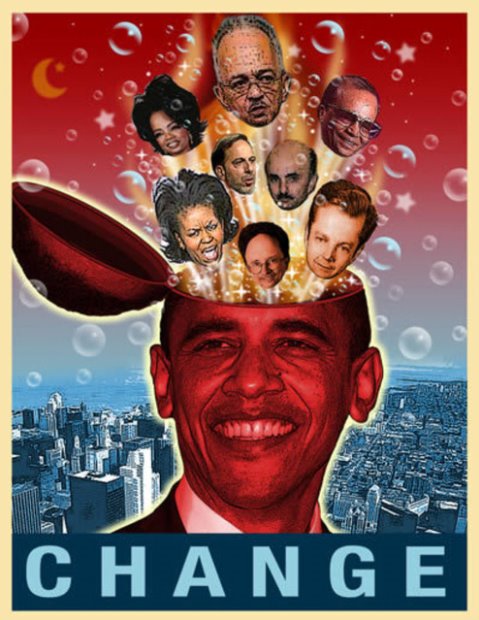
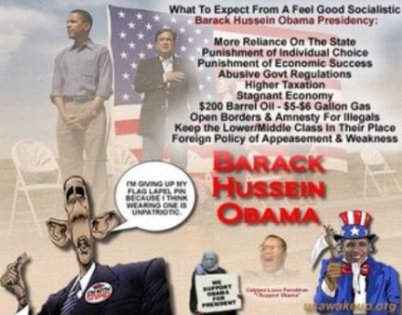
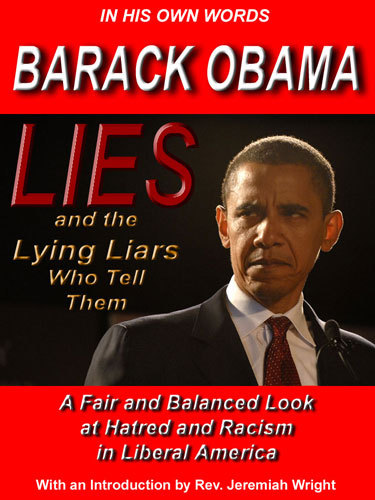
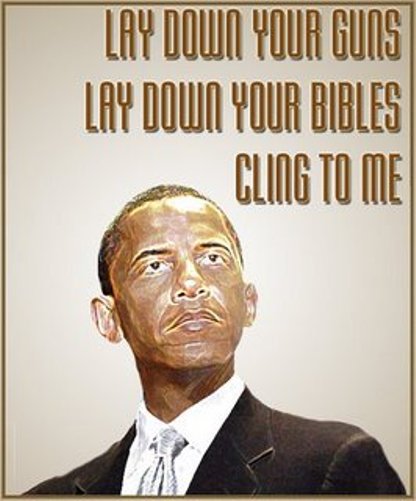
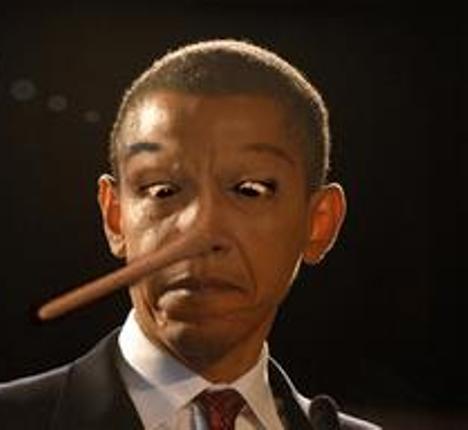 Last edited by homedawg; 10-08-2008, 03:22 PM.
Last edited by homedawg; 10-08-2008, 03:22 PM.Comment
-
Palin's Famous Family Ties Revealed
Sarah Palin is linked in her lineage to Franklin Roosevelt. She also has a connection with Princess Diana.
How Are They Related?
According to genealogists at Ancestry.com:
Roosevelt is Palin's ninth cousin once removed. Their common ancestor is Rev. John Lothrop, who came to Massachusetts in 1634.
Palin is a 10th cousin of Princess Diana.


Comment
-
Great Point!! :laughing:Palin's Famous Family Ties Revealed
Sarah Palin is linked in her lineage to Franklin Roosevelt. She also has a connection with Princess Diana.
How Are They Related?
According to genealogists at Ancestry.com:
Roosevelt is Palin's ninth cousin once removed. Their common ancestor is Rev. John Lothrop, who came to Massachusetts in 1634.
Palin is a 10th cousin of Princess Diana.


HD is losing it...
Stay with your anti-Obama, pro-McCain stance, and stay away from Palin...she's got nothing.... :thumbs:
Ancestry....lmao.
Can't wait until that nutbar crawls back into her hole.Last edited by JohnnyMapleLeaf; 10-08-2008, 05:49 PM.Comment
-
Hole? :laughing:
Last I checked, Alaska Is a part of Canada! :beer2:Comment
-
Comment
-
thought you weren't coming back in here anymore.....:dunno: :dunno:
it's like a car wreck dude....you try and be cool and look the other way but you end up gawking just like everyone else.....:beerbang:
Palin dropping the Puck at the Flyers opener...........:beerbang: :beerbang:I am the M'bah a'Flyers Fan !Comment
-
lmao...you're the worst for that too! But you're right...I find it amusing...
Yeah...I heard she's dropping the puck... Maybe she'll "catch" a puck like the organ player in Slapshot... :laughing:Comment


Comment